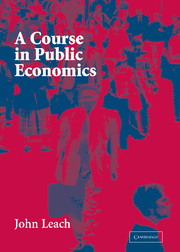Book contents
- Frontmatter
- Contents
- List of Figures
- Preface
- 1 Introduction
- Markets
- Externalities
- Public Goods
- 10 Pure Public Goods
- 11 Two Examples of Pure Public Goods
- 12 Impure Public Goods
- 13 The Link between Public Goods and Externalities
- Imperfect Competition
- Taxation and Efficiency
- Asymmetric Information and Efficiency
- Asymmetric Information and Income Redistribution
- A Note on Maximization
- References
- Index
12 - Impure Public Goods
from Public Goods
Published online by Cambridge University Press: 06 July 2010
- Frontmatter
- Contents
- List of Figures
- Preface
- 1 Introduction
- Markets
- Externalities
- Public Goods
- 10 Pure Public Goods
- 11 Two Examples of Pure Public Goods
- 12 Impure Public Goods
- 13 The Link between Public Goods and Externalities
- Imperfect Competition
- Taxation and Efficiency
- Asymmetric Information and Efficiency
- Asymmetric Information and Income Redistribution
- A Note on Maximization
- References
- Index
Summary
It has been assumed so far that all goods fall into one of two categories. Pure public goods are non-rivalrous in consumption, meaning that one person's consumption of any of these goods does not interfere with any other person's consumption of the same good. The clarity of your radio reception, for example, is independent of the number of other listeners. Private goods are rivalrous in consumption, meaning that only one person can consume each unit of these goods. Food and clothing are examples of goods in this category. But there are many other goods, including parks and recreational facilities, police and fire protection, and roads and bridges, that do not fit into either category. Consumption of one of these goods by another person reduces, but does not eliminate, the benefits that other people receive from their consumption of the same good. These goods are called impure public goods, and are said to be partially rivalrous or congestible.
Impure public goods also differ from pure public goods in that they are often excludable. Access to many recreational facilities is controlled, and toll roads and toll bridges are not unfamiliar. Fire and police protection are more problematic. Controlling access to these services is more difficult, and even if it were feasible, it would raise serious ethical questions.
The possibility of controlling access to impure public goods has two important implications. First, provision by private firms or by governments on a “fee for service” basis becomes possible, because free riding can be eliminated.
- Type
- Chapter
- Information
- A Course in Public Economics , pp. 187 - 199Publisher: Cambridge University PressPrint publication year: 2003
- 1
- Cited by



